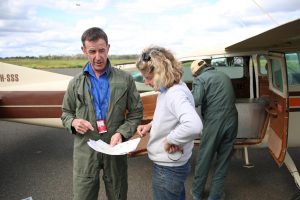
Aerial baiting pilot Cracker, left, with senior Western LLS biosecurity officer Robynne Wells-Budd at the Cobar airstrip.
DEHYDRATED meat was used for the first time in the successful spring aerial wild dog baiting program in the Local Land Services Western Region despite extensive wet weather disruptions.
Aerial bait drops were due to start at Wanaaring in mid-September in conjunction with on ground baiting by landholders, but persistent rain resulted in frequent delays and recalibration of plans due to road closures and wet air strips.
However, Local Community Manager with Local Land Services Western Region Andrew Hull said the spring aerial baiting campaign was successfully completed despite the wet weather.
“It was a credit to the flexibility of the Local Land Services Western team that they were able to accommodate a range of weather events in this welcome but extraordinary season.”
Local Land Services worked with landholders to submit an application to the Department of Primary Industries for aerial baiting to target remote and inaccessible areas and areas of high dog activity.
Bait drops were flown out of airstrips at Broken Hill, Cobar and Packsaddle, and coordinated with ground baiting by landholders.
“We have had a greater focus in 2016 on strategic collaboration where neighbouring properties work together in pest management groups to maximise the effectiveness of wild dog control,” Mr Hull said.
In a first for western aerial baiting projects, dehydrated meat was used in the spring bait drops.
“They’re lighter and you can fit more baits per load into the plane. They’re also drier than raw meat and easier to handle,” Mr Hull said.
Aerial baiting through the Local Land Services Western Region Predator Program has been funded in 2016 through the National Landcare Program. With the spring baiting campaign now complete, planning is already underway for the autumn 2017 baiting program.

HAVE YOUR SAY